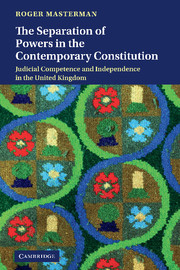 The Separation of Powers in the Contemporary Constitution
The Separation of Powers in the Contemporary Constitution Book contents
- Frontmatter
- Contents
- Acknowledgements
- Table of cases
- Introduction
- PART I Separation of powers, the Human Rights Act and the European Convention on Human Rights
- PART II Judicial engagement with the ‘political’ branches
- PART III The creative powers of courts
- PART IV The separation of the judicial branch
- 8 The independence of the judiciary
- 9 Towards constitutional separation
- Select bibliography
- Index
- References
8 - The independence of the judiciary
from PART IV - The separation of the judicial branch
Published online by Cambridge University Press: 10 January 2011
- Frontmatter
- Contents
- Acknowledgements
- Table of cases
- Introduction
- PART I Separation of powers, the Human Rights Act and the European Convention on Human Rights
- PART II Judicial engagement with the ‘political’ branches
- PART III The creative powers of courts
- PART IV The separation of the judicial branch
- 8 The independence of the judiciary
- 9 Towards constitutional separation
- Select bibliography
- Index
- References
Summary
Introduction
It is the institutional and individual independence of the judiciary that underpins the ability of judges to adjudicate, impartially, between the parties that appear before them. In addition, it is this independence that grants legitimacy to the judicial role, for without it, claims to impartiality would rightly be regarded as a sham. Judicial independence, therefore – crucially – provides the foundations from which judicial analysis of politically contested issues can legitimately proceed. An independent judiciary – autonomous from the elected branches of government and impartial as between the parties to the case – is regarded as a fundamental requirement of the rule of law, and has been argued to form the central pillar of separation of powers in the UK constitution.
Judicial independence, however, is also an elusive concept that contains a number of distinctive and interrelated characteristics. This chapter seeks to examine the status of judicial independence in its institutional and functional senses – that is, the structural independence of the judiciary from the elected branches of government, and the degree to which the judicial process can be regarded as being independent of executive and legislative influence. Judicial independence has what might be called structural and individual dynamics – the first concerning the separateness of the judges from the other branches of government, the latter ensuring the impartiality of individual proceedings.
- Type
- Chapter
- Information
- The Separation of Powers in the Contemporary ConstitutionJudicial Competence and Independence in the United Kingdom, pp. 207 - 244Publisher: Cambridge University PressPrint publication year: 2010


